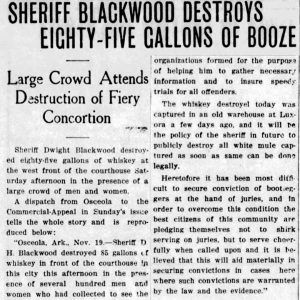calsfoundation@cals.org
Dwight Hale Blackwood (1886–1953)
Dwight Hale Blackwood was a minor league baseball player who, after retiring from the game, became involved with state politics. He had a successful career in public office, holding a number of positions in state and local government in a career that extended from the mid-1910s through the early 1930s.
Dwight Blackwood was born on December 24, 1886, in Osceola (Mississippi County) to John Oscar Blackwood and Nancy Emery Hale Blackwood. One of twelve children, he received his early education in the Osceola schools. Later, he attended what are now Ouachita Baptist University in Arkadelphia (Clark County) and the University of Arkansas in Fayetteville (Washington County). Blackwood began his professional baseball career in 1908, playing in the minor leagues—including the Arkansas State League, the Texas League, the Northeast Arkansas League, and the Cotton States League—through the 1912 season.
He married Lucy Clopton Jones in 1909. The couple had two children, a son and a daughter.
Blackwood’s biography in the Arkansas Department of Transportation’s official publication stated that he finished his professional baseball career with the Cleveland team of the American League around 1914 but was forced to retire due to an arm injury. However, there is nothing in official major league baseball records to confirm that he ever played major league baseball. What is clear is that, in 1914, he left baseball and returned to Osceola, where he began working for the county sheriff’s office. After serving first as chief deputy sheriff from 1914 to 1918, he was elected sheriff of Mississippi County in 1918, outpolling his opponent by a 6–1 margin. Serving as sheriff for three terms, from 1918 to 1924, he earned a reputation as a staunch opponent of illegal liquor, arresting more than 100 illegal distillers and destroying more than 200 moonshine stills.
He also became enmeshed in the controversial 1921 lynching case of Henry Lowery. While newly elected Governor Thomas McRae criticized Blackwood for not preventing the abduction and brutal death of Lowery at the hands of a large local mob while he was in the process of being transferred from a Texas jail to Mississippi County, others praised the local sheriff’s efforts to protect the lives of two other African-American prisoners in his jail who were reportedly targeted for the same fate.
His strong record as sheriff led to his appointment in October 1925 to the position of state treasurer, where he filled an unexpired term that ran until 1927. Rather than seek election as state treasurer, Blackwood ran in 1926 for the position of commissioner of state lands, highways, and improvements. Easily winning election, he served in that post from 1927 to 1929 and then served as the chairman of the Arkansas State Highway Commission from the mid-1920s until 1932. In that role, Blackwood oversaw an ambitious road-building effort, funded primarily by the passage in 1927 of the Martineau Road Law, which provided over $50 million for road construction. While the commission under his leadership underwent a number of audits in response to charges of financial irregularities, nothing amiss was ever discovered, and numerous major projects, including the construction of the Black River Bridge in Pocahontas (Randolph County) and the St. Francis River Bridge, were begun on his watch. In 1932, Blackwood ran for the Democratic nomination for governor, but he was defeated by Junius Marion Futrell, a judge and former state senator who went on to serve two terms.
Following his unsuccessful gubernatorial effort, Blackwood retired from politics and returned to Osceola. He was active in the Little Rock Methodist Church as well as the Osceola Lodge of the Masons. Blackwood died on June 18, 1953, and is buried in Violet Cemetery in Osceola.
For additional information:
“Dwight Blackwood.” Baseball-Reference.com. http://www.baseball-reference.com/register/player.cgi?id=blackw001dwi (accessed August 26, 2020).
“Dwight H. Blackwood.” Arkansas Highways 4 (January 1927): 5. Online at http://www.arkansashighways.com/historic_bridge/Early%20Arkansas%20Highway%20Magazines/Volume
%204%20-%201927/Vol.%204,%20January%201927,%20No.1.pdf (accessed August 26, 2020).
“Dwight Hale Blackwood.” Find-a-Grave.com. http://www.findagrave.com/cgi-bin/fg.cgi?page=gr&GRid=27876912 (accessed August 26, 2020).
Herndon, Dallas Tabor. Centennial History of Arkansas, Vol. 3 Little Rock: The S.J. Clarke Publishing Company, 1922.
William H. Pruden III
Ravenscroft School
 Early Twentieth Century, 1901 through 1940
Early Twentieth Century, 1901 through 1940 Politics and Government
Politics and Government Dwight H. Blackwood
Dwight H. Blackwood  Sheriff Destroys Booze
Sheriff Destroys Booze 



Comments
No comments on this entry yet.